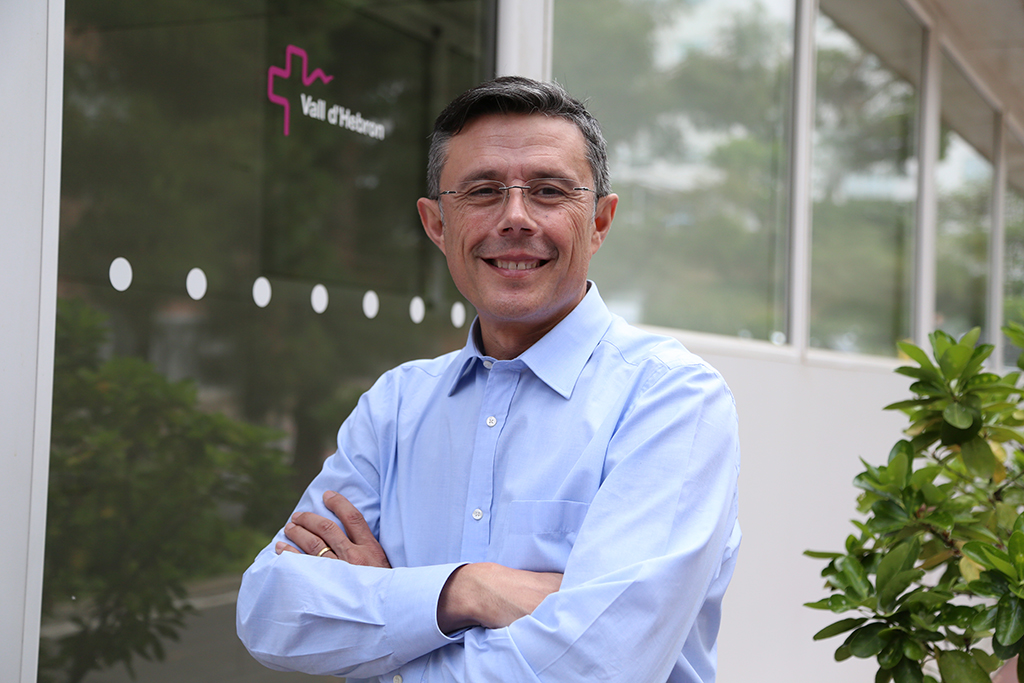"Even though technology will change how medicine is practised, we need to teach professionals to maintain the human touch when interacting with patients"

Joan Comella , CEO of the Vall d'Hebron Research Institute
Dr Joan Comella, CEO of the Vall d'Hebron Research Institute (VHIR) and member of the UOC eHealth Center's Advisory Board, analyses how new technologies and advancements in big data analysis techniques are changing medicine, research, and also patients' role in the health system. Comella was one of the speakers at the eSalut. Reptes i necessitats actuals dels professionals de la salut (E-Health. Current challenges for and needs of healthcare professionals) symposium, at which the UOC's University Master's Degree in E-Health was presented.
Dr Joan Comella, CEO of the Vall d'Hebron Research Institute (VHIR) and member of the UOC eHealth Center's Advisory Board, analyses how new technologies and advancements in big data analysis techniques are changing medicine, research, and also patients' role in the health system. Comella was one of the speakers at the eSalut. Reptes i necessitats actuals dels professionals de la salut (E-Health. Current challenges for and needs of healthcare professionals) symposium, at which the UOC's University Master's Degree in E-Health was presented.
How do new data analysis techniques and the possibilities of new technologies affect the traditional research method?
It has completely changed. The most disruptive breakthroughs in science are almost always due to technological advances. For example, the microscope allowed us to analyse cell structure for the first time. Now, we find ourselves in a similar situation. With today's computing power and the development of algorithms, it’s possible to analyse data volumes that were unimaginable just a few years ago. We now have the means to understand different aspects of physiological processes, like how genes or proteins work; we can perform cross-analyses and see how these data relate to each other. Until now, these analyses had been carried out on a small scale, but today, technology allows us to do this with huge amounts of data. This will enable us to build a story for which, for the moment, we only know the ending, as well as provide us with answers that are currently unimaginable.
What currently untreatable health problems will we be able to solve with technology in the future?
We will be able to personalize treatments to each patient type. Many diseases that are known today by a single name actually vary from one individual to another. Breast cancer, for example. We now know that treatment must be personalized depending on the person and the tumour's molecular characteristics. Some treatments that we prescribe today will no longer make sense in the not too distant future. By analysing big data, we’ll be able to personalize treatments. It’s still very early, but in the future, our capabilities will be much greater. These tools will have a revolutionary impact on medicine.
Big data analysis not only enables us to personalize medicine but also to identify more and more genes associated with diseases. We have all heard about the “Alzheimer gene”. Advances in data research will provide information and answers that we cannot yet predict.
Faced with technological advancements, it's obvious that both researchers and health professionals need to update their training. What new skills do they need?
Doctors need to make sure they're up to date in terms of their knowledge and current technologies. We must be able to anticipate their needs and predict how medicine will evolve. The symposium showed us that these needs are centred on two complementary fields. On the one hand, there is the unstoppable pace of technological progress, particularly in terms of software tools that analyse huge quantities of data, which will change how we perform diagnostic procedures. It will also change research processes: we will no longer have to prove a hypothesis; rather, by analysing population data we could gather information from which we will have to extract questions and knowledge. In medicine, the analysis of large omic databases (genomic, proteomic, etc) will enable us to fine-tune diagnoses and personalize treatments.
On the other hand, these technological capabilities must be compatible with humanistic concepts, which often run the risk of being overpowered by technology. We're already seeing it today when patients complain that the doctor spends the whole appointment typing on the computer. So, even though technology will change how medicine is practised, we need to teach professionals to maintain the human touch and interact with their patients.
The same goes for research professionals. Even though they’re more involved with the technological side of things, they must be empathetic and not lose sight of human values, which will become essential for new professions. And it’s important to train professionals to apply transdisciplinary approaches, practise teamwork and keep an open mind, in spite of being highly specialized in their respective fields.
What will the patient's role be in this increasingly technology-dominated health sector?
At the moment there are patients who are very interested in new technologies, while others do not share the same views. However, the tendency is for technology to be a growing part of the doctor-patient relationship. This should increase the possibility for interaction and allow the patient to be involved in the decision-making process. We need doctors who are up to date and patients who can obtain information from reliable sources.
How do you think the UOC's University Master's Degree in E-Health can help improve health professionals' shortcomings with regard to technology?
The UOC has had the foresight to fill the gap and anticipate the changes that will be introduced in the health sector in the near future. Today, technology is essential in healthcare and also in terms of self-managing one’s own health. The UOC has clearly done a good job fulfilling a need in a very important field.
Press contact
-
Editorial department
